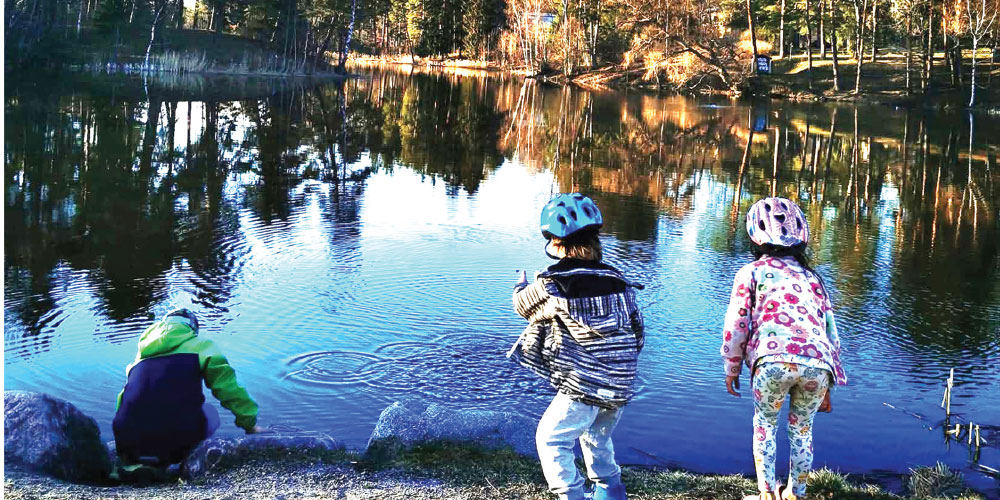- Thursday, 25 December 2025
Happiness Lessons From Finland
Finland is in the headlines these days as it has won the top spot in the World Happiness Report for the eighth year in a row. This is obviously an enticing achievement for the northern European nation with about 5.5 million populations. Finland and Nepal differ in terms of history, culture and geography, but Nepal can learn valuable lessons to translate the government’s slogan of Prosperous Nepal, Happy Nepali and enhance citizens’ well-being. As a Nepali citizen who has lived and worked in Finland, I find it relevant to discuss what factors contribute to Finland’s enduring happiness and what Nepal can learn from them.
One of the key reasons Finland excels year after year in happiness index is the high level of trust its citizens place in one another and in governing institutions. There is inimitable social trust among the Finns, and they are fully confident in the honesty and integrity of the government to deliver essential services like education and healthcare. The country has a universal social support system in place that offers assistance to people of all age groups from infants to the elderly. The citizens have equitable access to these services; hence, there is no issue of inequality in this country. The inclusive social services have not only built trust in government and public institutions but have also fostered a sense of strong community and mutual support.
Living in Finland for two decades now, I have observed one striking example of this trust in Helsinki’s public transportation system. Ticket checks are a rare occurrence, but nearly everyone buys a ticket for the train. The citizens have been instilled with a sense that they should honour the system, and they believe that their fellow citizens will do the same. This also applies to lost property. Lost wallets or bags are almost always returned to their owners, often found by strangers who trust that doing so will benefit the community.
Nepal, like many developing nations, faces challenges in terms of governance and people’s trust in public institutions and among themselves. This situation can be changed by strengthening social networks. Unlike Finland, Nepal is plagued by corruption, so the government must take steps towards improving transparency, accountability, and the equitable distribution of resources. Community-based initiatives, such as local cooperatives, can play a vital role in rebuilding trust by promoting collective responsibility and mutual aid.
Finland’s education system is considered to be one of the best in the entire world. Finnish education focuses not only on academic achievement but also on emotional intelligence, creativity and critical thinking. Importantly, it offers free, high-quality education to all, regardless of geographic and socio-economic background. During my 20-year stay in Finland, I have observed that a 10-year-old child’s dream of a future career is most likely to come true because of the strong support they receive from the system, which nurtures both their academic and personal growth. And the high-quality education the citizens receive makes a significant contribution to the happiness index.

Nepal's education system, especially in rural areas, faces significant challenges in accessibility and quality. To improve the happiness index, Nepal needs to increase investment in the field of education, as there is much to be done in terms of resources, infrastructure, and support for teacher training and professional development in both private and public schools. Making teacher training mandatory and regular will surely enhance the quality of education. The better the education system, the higher the likelihood of greater happiness.
It is also necessary to update the curriculum with a focus on mental health education, life skills, and vocational training to prepare students for both academic and real-world challenges.
Early childhood education is of critical importance as it builds the foundation for future learning and development. It is necessary to increase investment in early childhood educators to make sure that young children receive support for cognitive and emotional growth.
Finland’s social welfare system is the main foundation of the country’s high standard of living and plays a vital role in ensuring financial and social security for its citizens. The provision of universal healthcare, pensions, and various other social services ensures that all citizens can rely on a strong safety net throughout their lives. Such a comprehensive support system will not only provide peace of mind but also make a significant contribution to the overall happiness and well-being of its citizens.
Nepal’s social welfare system is still evolving, and many citizens, especially in rural areas, lack access to essential services. The government needs to take initiatives to widen the coverage of healthcare and social safety nets so as to improve the well-being, particularly for vulnerable groups of people. A robust welfare system will reduce insecurity, improve quality of life, and contribute to national happiness.
Finland’s natural beauty—from forests to lakes and the Northern Lights—makes a significant contribution to the happiness of its people. Finns see nature as a therapeutic agent, providing peace and mental well-being. It is quite common for them to engage in outdoor activities like hiking, skiing, and ice fishing. The concept of "Everyman's Right" grants people access to private forests for activities like berry-picking.
Nepal, with its towering Himalayas, lush green valleys and meandering rivers, is well resourced to boost people’s happiness through nature. However, in many places traditional trekking trails are being transformed into motorable roads, limiting opportunities for exposure to pristine nature. The government from the centre to the local level are responsible for making sure that road construction does not hamper the ecology and upset people’s livelihoods. They should accord priority to eco-tourism and sustainable practices to encourage citizens to engage with their surroundings. Outdoor activities like trekking or simply enjoying the beauty of the snow-capped Himalayas can reduce stress and improve overall well-being.
Finland places a high importance on work-life balance. The Finns give priority to spending time with family and friends and take personal time to recharge themselves. The state plays a crucial role in supporting this balance through policies and cultural practices that accord priority to family time, personal well-being, and a healthy separation between work and private life. This emphasis on balance contributes significantly to their happiness. Besides, mental health is taken seriously, with an array of resources available to those facing stress or other challenges.
Nepal’s work schedules, particularly in urban areas, can be demanding, with long hours and high expectations. So the government needs to take measures to maintain work-life balance and accord due priority to mental health. A healthy balance between work and life would result in greater happiness and well-being in Nepal. Tens of thousands of Nepali youths are leaving the country in search of better opportunities abroad, so the government should aim to enhance the local work environment, promote entrepreneurship, and generate sustainable career opportunities, especially in the fields of hydropower, tourism, and agriculture, which hold huge potential in Nepal. The government should also espouse policies that encourage relaxation, family time, and personal pursuits—along with accessible mental health services—to build a healthier and happier society.
Finnish citizens are highly engaged in their communities and actively participate in the governance mechanism. This sense of ownership and responsibility is integral to Finland’s happiness. Public participation builds a more informed citizenry, contributing to overall well-being. In Finland, foreign nationals who have legally resided in the country for two years are eligible to vote in municipal elections, which promotes integration and civic engagement.
While Finland allows foreign nationals living in the country for more than two years to participate in local elections, millions of Nepalis living abroad are denied the right to vote in national elections. This exclusion prevents a large section of the population from influencing decisions that affect their homeland. So Nepal needs to adopt policies that grant voting rights to Nepalis living and working abroad. Promoting civic engagement and local governance will strengthen democracy and contribute to the happiness of all citizens.
While Nepal and Finland differ in many respects, the core components contributing to Finland's happiness—social support, holistic education, work-life balance, connection to nature, social welfare, and civic engagement—are universally relevant. Nepal, endowed with abundant natural resources, a youthful population, and a growing economy, has the potential to implement similar measures to improve the well-being of its citizens.
By implementing Finland’s successful strategies in the Nepali context, Nepal can build a prosperous, healthy, and happy future. With the right investment in social welfare, education, and mental health, Nepal can begin a new chapter in its pursuit of happiness, mirroring Finland’s enduring success.
(A journalist in Nepal in the early 2000s, the author currently works as a social services professional in the Helsinki region.)














-original-thumb.jpg)